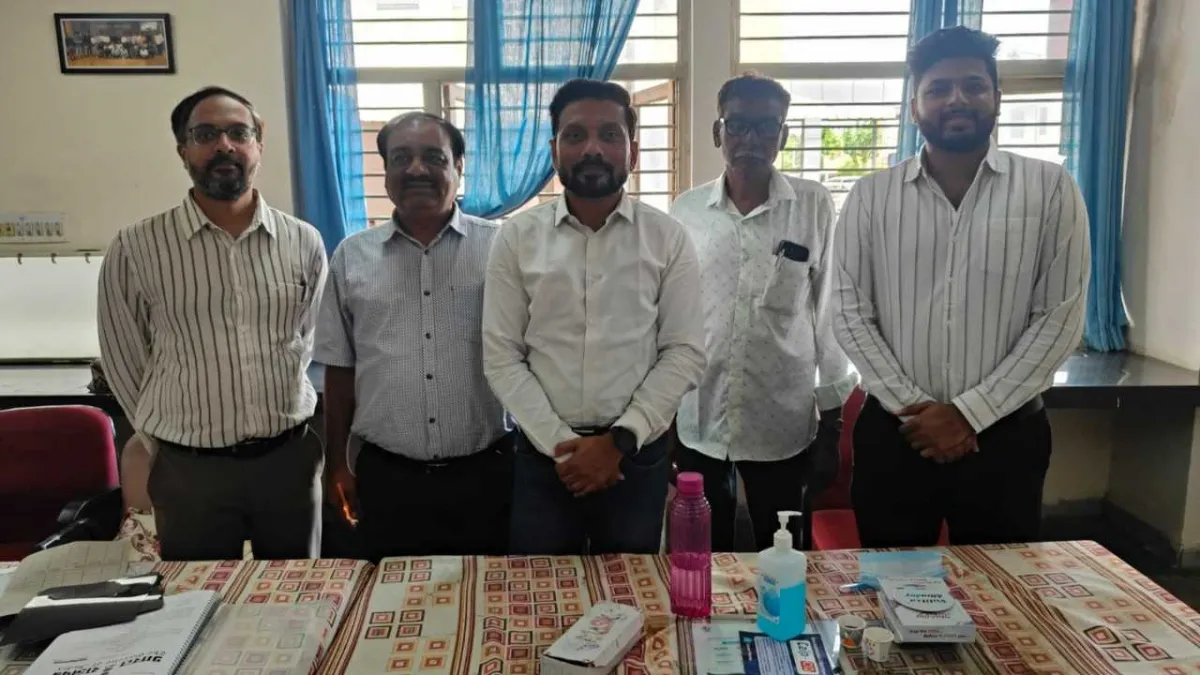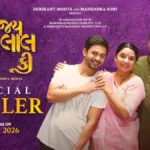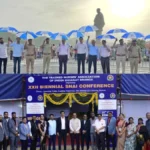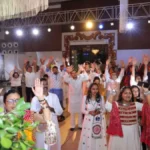Life Back on Track After Successful Knee Surgery Under Ayushman Card Scheme
The life of Nandlalbhai Veljibhai Dhabhi, a resident of Thorala village in Veerpur, Saurashtra, came to a standstill after a road accident. Despite an expensive operation at a private hospital, his right leg had completely given way at the knee, making walking nearly impossible. However, the expert team at the orthopedic department of Rajkot Civil Hospital performed a free surgery under the Ayushman Card scheme, not only giving his leg a new lease on life but also restoring his happiness.
Nearly two years ago, Nandlalbhai suffered nerve damage in his right leg during a road accident. The surgery performed at a private hospital was unsuccessful, and over time, the condition of his knee worsened. Exhausted, he arrived at Rajkot Civil Hospital with his family, where, after an examination, immediate admission and surgery were recommended.
The Unit-2 team successfully completed a knee replacement surgery. After the operation, an emotional Nandlalbhai said, “After the surgery at the private hospital, I couldn’t walk and had to depend on others. The doctors at Civil Hospital got me back on my feet. The atmosphere here is homely, the staff is cooperative, and the cleanliness is excellent. Now I can come to the hospital for check-ups on my own.”
His family called it a “miracle,” saying, “This surgery, which would have cost around three lakh rupees at a private hospital, was done here for free under the Ayushman Card scheme. We are grateful to the entire Civil Hospital.”
Patients from every corner of Saurashtra come to the orthopedic department of Rajkot Civil Hospital for treatment. Serious ligament, tendon, and knee-related issues are treated here at a high level. Thanks to the Ayushman scheme and the hospital’s expertise, many patients like Nandlalbhai Dhabhi have been able to walk the path of life again.
Rajkot Civil Hospital
Rajkot Civil Hospital is a major government-run healthcare facility in Rajkot, Gujarat, established during British colonial rule in the late 19th or early 20th century. It serves as a key medical center for the region, offering a wide range of services to the public. The hospital reflects the evolution of healthcare infrastructure in India, blending historical significance with modern medical care.
Ayushman Card scheme
The **Ayushman Card scheme**, part of India’s **Ayushman Bharat Pradhan Mantri Jan Arogya Yojana (AB-PMJAY)**, is a government health insurance initiative launched in 2018 to provide free healthcare coverage of up to ₹5 lakh per family per year for secondary and tertiary care hospitalization. It primarily targets economically vulnerable families, benefiting over 500 million people, making it one of the world’s largest public health insurance programs. The scheme aims to reduce out-of-pocket medical expenses and improve access to quality healthcare for India’s underprivileged populations.
Thorala village
Thorala Village is a traditional rural settlement in Maharashtra, India, known for its historical and cultural significance. The village is believed to have ancient roots, with ties to local tribal communities and Maratha heritage. Today, it preserves traditional customs, crafts, and festivals, offering a glimpse into Maharashtra’s rural life.
Veerpur
There is limited widely known historical or cultural information available about a place called “Veerpur.” It may refer to a small locality or village in India, possibly in regions like Gujarat or Uttar Pradesh where similar names exist. If you are referring to a specific site or monument named Veerpur, additional details would help provide a more accurate summary. Let me know if you’d like assistance in finding more information!
Saurashtra
Saurashtra is a peninsula in the western Indian state of Gujarat, known for its rich cultural heritage, historic ports, and religious significance. Historically, it was part of ancient trade routes and home to the legendary Dwarka, believed to be Lord Krishna’s kingdom. The region is also famous for its vibrant festivals, traditional handicrafts, and Jain pilgrimage sites like Palitana.
orthopedic department
The Orthopedic Department is a specialized medical unit focused on diagnosing, treating, and preventing musculoskeletal disorders, including bones, joints, ligaments, and muscles. Originating in the 18th century with advancements in treating deformities in children, modern orthopedics now includes trauma care, sports medicine, and surgical innovations like joint replacements. It plays a critical role in rehabilitation and improving patients’ mobility and quality of life.
Unit-2
“Unit-2” is a cultural and artistic space often associated with experimental performances, avant-garde art, and underground music scenes. While its specific history may vary by location, such spaces typically emerge in repurposed industrial buildings or alternative venues, fostering creativity outside mainstream institutions. These sites play a key role in countercultural movements, offering a platform for emerging artists and unconventional expression.
*(Note: If “Unit-2” refers to a specific place, additional context would help refine this summary.)*
Civil Hospital
The Civil Hospital is a historic medical institution, often one of the oldest in its region, providing healthcare services to the general public. Many such hospitals were established during the colonial era or in the early modern period to serve urban populations. For example, the Civil Hospital in Karachi, Pakistan, was founded in 1898 during British rule and remains a key healthcare center today.






